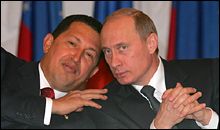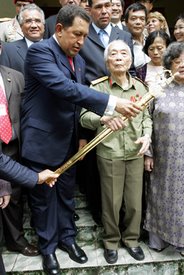Anti-Western Alliance Forming
Further evidence of the growing anti Western Alliance forming between the socialist, "formerly" socialist and Islamic worlds.
From the Communist Party USA's latest Peoples Weekly World
Fresh from the Mercosur Summit in Argentina, Venezuelan President Hugo Chavez left July 23 on a world trip to strengthen alliances, secure trade deals and gain support for Venezuela’s bid to join the UN Security Council.
The first stop was Belarus, followed by Russia, Qatar, Iran, Vietnam and Mali. It was Chavez’s fourth visit to Russia, his fifth to Iran. Plans to visit North Korea did not materialize.
In Belarus, after paying homage to the Soviet victory over Nazi fascism, Chavez and President Alexander Lukashenko pledged to cooperate within the UN and the Movement of Nonaligned Countries. On July 24, they signed seven economic agreements and agreed to share technology. The two countries shared trade worth $16 million in 2005.

Politics had a high profile. In Russia, at a July 27 press conference, Chavez declared, “The biggest threat which exists in the world is the empire of the United States. … It is a senseless, blind, stupid giant which doesn’t understand the world, doesn’t understand human rights.”
Reporters quoted an anonymous Russian official as saying, “The positions of Russia and Venezuela on the majority of international problems are close or coincide.” President Vladimir Putin gave backing to Venezuela’s run for a Security Council seat.
Russian companies will be exploring new gas and oil fields in Venezuela. Discussions took place on joint engineering, metallurgical and space programs.
The two countries also signed a $3 billion arms deal, intended to strengthen Venezuela’s defenses against the possibility of a U.S. military invasion.
After a stopover in Qatar, Chavez proceeded to Iran. The two countries have arrived at 86 commercial agreements since 1999, and Iran has put $1 billion into the Venezuelan energy, construction and tractor-building sectors. Now Iran’s state-owned oil and gas company plans to invest $4 billion more to develop oil and gas fields in Venezuela and to form two joint petrochemical ventures, one of them in Indonesia.
Iran will also construct a refinery in Venezuela and begin assembling automobiles there. Joint ventures have been set up for making bicycles, medicines and industrial molds.

Hugo Chavez presents Simon Bolivar Sword to Vo Nguyen Giap, legendary Vietnamese general, during Chavez's visit to Hanoi, Aug. 1.
Chavez’s visit to Vietnam was the first ever for a Venezuelan head of state.
Crude oil is Vietnam’s largest export. The Venezuelan guests said Vietnam could gain $2 billion in additional income from sales of finished petroleum products. Chavez offered assistance in building a refinery. Negotiators also signed cultural exchange agreements and devised a legal framework for future trade relations.
The final stop on his tour was the West African nation of Mali, where he signed a bilateral energy agreement with President Amadou Toumani Toure.
From the Communist Party USA's latest Peoples Weekly World
Fresh from the Mercosur Summit in Argentina, Venezuelan President Hugo Chavez left July 23 on a world trip to strengthen alliances, secure trade deals and gain support for Venezuela’s bid to join the UN Security Council.
The first stop was Belarus, followed by Russia, Qatar, Iran, Vietnam and Mali. It was Chavez’s fourth visit to Russia, his fifth to Iran. Plans to visit North Korea did not materialize.
In Belarus, after paying homage to the Soviet victory over Nazi fascism, Chavez and President Alexander Lukashenko pledged to cooperate within the UN and the Movement of Nonaligned Countries. On July 24, they signed seven economic agreements and agreed to share technology. The two countries shared trade worth $16 million in 2005.

Politics had a high profile. In Russia, at a July 27 press conference, Chavez declared, “The biggest threat which exists in the world is the empire of the United States. … It is a senseless, blind, stupid giant which doesn’t understand the world, doesn’t understand human rights.”
Reporters quoted an anonymous Russian official as saying, “The positions of Russia and Venezuela on the majority of international problems are close or coincide.” President Vladimir Putin gave backing to Venezuela’s run for a Security Council seat.
Russian companies will be exploring new gas and oil fields in Venezuela. Discussions took place on joint engineering, metallurgical and space programs.
The two countries also signed a $3 billion arms deal, intended to strengthen Venezuela’s defenses against the possibility of a U.S. military invasion.
After a stopover in Qatar, Chavez proceeded to Iran. The two countries have arrived at 86 commercial agreements since 1999, and Iran has put $1 billion into the Venezuelan energy, construction and tractor-building sectors. Now Iran’s state-owned oil and gas company plans to invest $4 billion more to develop oil and gas fields in Venezuela and to form two joint petrochemical ventures, one of them in Indonesia.
Iran will also construct a refinery in Venezuela and begin assembling automobiles there. Joint ventures have been set up for making bicycles, medicines and industrial molds.

Hugo Chavez presents Simon Bolivar Sword to Vo Nguyen Giap, legendary Vietnamese general, during Chavez's visit to Hanoi, Aug. 1.
Chavez’s visit to Vietnam was the first ever for a Venezuelan head of state.
Crude oil is Vietnam’s largest export. The Venezuelan guests said Vietnam could gain $2 billion in additional income from sales of finished petroleum products. Chavez offered assistance in building a refinery. Negotiators also signed cultural exchange agreements and devised a legal framework for future trade relations.
The final stop on his tour was the West African nation of Mali, where he signed a bilateral energy agreement with President Amadou Toumani Toure.

3 Comments:
Lukashenko is glad anyone will visit him, but I was surprised Chavez was so well received in Russia until oil was mentioned. Ah, the O word. The West should stop yanking Russia's chain over WTO membership so they don't have any excuse for making trouble.
Bit of a naive view Camryn. Ever considered that Putin, chavez etc might be motivated by power and ideology. If they are, I don't think being nice will help.
I'm sure Chavez is motivated by both, and he's an idiot that I certainly don't suggest being nice with. Putin isn't so ideological, so I think it's worth letting him feel powerful in good ways (taking credit at home for getting Russia into the WTO) rather than bad ways (hanging out with freaks like Chavez). Certainly, getting Russia into the WTO is as good for us as it is for them anyway.
Post a Comment
Subscribe to Post Comments [Atom]
<< Home